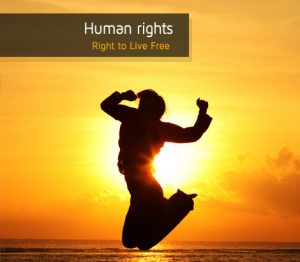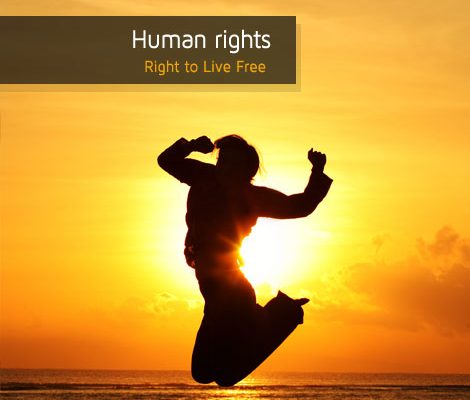Your Right To Personal LIberty
YOUR RIGHT TO PERSONAL LIBERTY
-Section 35
This is one of the important provisions of the Constitution as regards respect for the personal liberty of the citizens. The aim of this constitutional provision is to prevent situations where you are arbitrarily denied or deprived of your personal liberty without due course or without lawful justification. Let me now expatiate on this constitutional provision.
A. What Is Unlawful Deprivation Of Liberty?
The provision of Section 35 states as follows:
“Every person shall be entitled to his personal liberty and no person shall be deprived of such liberty…”
The Cambridge dictionary defines liberty as: freedom to live as you wish or go where you want. When the Constitution thus says you are entitled to your personal liberty, it means that you are entitled to live as you wish or go where you wish, without restraint, deprivation, confinement or inhibition. What this simply means is that it is wrong, unlawful and unconstitutional for anybody to detain you or hold you captive against your will. You are entitled under the law to claim damages from anybody who detains you without lawful authority and justification.
Note that the criminal laws also support this with laws that prevent deprivation of personal liberty. So, it is a criminal offence for someone to hold you captive against your will. Such act could come under kidnapping, abduction, hostage-taking, false imprisonment, etc., for which serious penalties are prescribed. Any detention without lawful authority is a felony under the criminal law. Therefore, aside from claiming damages for such unlawful deprivation of personal liberty, the offender may go to jail if such allegation is proved against him.
However, there are certain exceptions to this law. According to the Constitution, there are certain instances when a person may be detained without his consent, as follows:
- Where a court has tried such a person, found him guilty of a criminal offence and sentenced him to jail in execution of such a sentence;
- Where a court has ordered a person to do something which he failed to do and he is thus detained as a consequence of disobeying the court order, e.g., if he is a criminal or somebody suspected of committing a crime and the court asks him to report in court which he failed to do.
- In addition, it is not an unlawful deprivation of liberty if the court has ordered someone to do something and he is being held in order for him to do that thing as ordered by the court.
- When a person commits an offence or is suspected of having committed an offence, the Police may arrest and detain him for the purpose of bringing him before the court. Or, if he is suspected of planning to commit a crime, he may be detained in order to prevent him from committing that crime.
- If the offender involved has not attained the age of 18 years, he may be detained in what is popularly called “welfare home” for the purpose of his education or welfare.
- A person may be detained against his will if he is a person suffering from infectious or contagious disease like leprosy or Ebola; or if he is insane/lunatic; or if he is a person addicted to drug or alcohol. But, such detention must be for the care and treatment of the person concerned or for the general protection of the whole community.
- A person may be detained to prevent his unlawful entry into Nigeria, or in order to effect his removal, expulsion or extradition from Nigeria.
You must note too, that in the case of a person who has been taken to court and detained awaiting trial, he cannot be detained for a period longer than the maximum period of imprisonment prescribed for the offence he has allegedly committed. As an example: unlawfully wearing the uniform of the armed forces or the police is a criminal offence punishable with 1 month’s imprisonment under the Criminal Code. If a person is charged for such an offence, and for any reason his bail could not be perfected and he has to be remanded in prison custody awaiting trial, he cannot be detained for more than a month because that is the maximum imprisonment prescribed for the offence.
B. Right To Be Informed Of Your Offence Within 24 Hours
It is a constitutional provision that any person who is arrested or detained shall be informed in writing within twenty-four hours (and in a language that he understands) of the facts and grounds for his arrest or detention. Most times, the Police arrest a suspect and clamp him in detention for days without telling him the basis of his arrest and/or detention. This is wrong under the Constitution. A person charged with any offence must be informed in writing within 24 hours what are the allegations against him. And, this must be in a language which he understands.
C. Your Right To Be Charged To Court And Tried Within A Reasonable Time.
It is a constitutional guarantee that a person who is arrested or detained by the Police for the purpose of bringing him to court because he is suspected of committing a crime must be charged to court within a reasonable time. Now, what is a reasonable time depends on the following factors:
- If the person is arrested and/or detained by the Police in a place where there is a court of competent jurisdiction within 40 kilometers from the Police station, the reasonable time is ONE DAY within which he must be charged to court.
- Where there is no court within a 40-kilometer radius from the station, the reasonable time for him to be charged to court is 2 DAYS, or any other longer period which the court considers as reasonable given the particular circumstances.
So, it is unconstitutional for the Police to detain a suspect for days without releasing him on bail or charging him to court. It is also unconstitutional for the Police to detain a suspect for days for the purpose of punishing him, because anybody accused of any offence is deemed innocent until the court proves him guilty. It is not for the Police to declare an offender guilty or punish him for such offence. Their constitutional duty is simply to investigate the alleged crime and charge the suspect to court within the time prescribed by the Constitution if they believe there is a case against him. Otherwise, the arrested person should be released.
It is unlawful for the Police to detain a suspect in custody on the excuse that investigations in the matter have not been concluded. Where a person is arrested on suspicion of a crime and the investigation is still ongoing, the suspect is entitled to be released on bail pending when the investigations will be concluded. Such a person may be asked to report to the police officers in charge of the investigation on such dates and time as they deem fit. It is only upon a court order that a person may be allowed to be further detained pending the outcome of investigations.
Furthermore, where any person is arrested or detained on suspicion of committing a crime, and has been taken before a court of law within a reasonable time, he is entitled to be released if he is not tried within the following period of time:
- If he is in custody or not entitled to bail, he must be tried within a period of 2 months from the date of his arrest or detention;
- If he has been released on bail, he must be tried within a period of 3 months from the date of his arrest or detention.
If either of these 2 conditions above is not met, such a person is entitled to be released either unconditionally or upon such conditions as are reasonably necessary to ensure that he appears for trial at a later date. It is common in our judicial system to find persons accused of misdemeanor or simple crimes, languishing in jail awaiting trial for several months and years. Infact, this category of persons awaiting trial constitutes the larger proportion of prison inmates, resulting in unnecessary congestion in the prisons. This is a clear breach of the Constitution. The supreme law of Nigeria says that if a person in prison awaiting trial is not tried within two months, he must be released. And, where he has been released on bail, he must be tried within three months, or be released. This release, though, is temporary and does not stop any further legal proceedings that may be brought against him for the same offence in the future.
D. Your Right To Compensation And Public Apology For Unlawful Arrest Or Detention
Many citizens do not know that the Constitution makes provisions for public apology and compensation to them for their unlawful arrest or detention. Some other people do not even believe such a provision exists. That is why many people get arrested and detained unlawfully by the Police, etc., and the transgressors go scot-free, while the victim dances to his church or mosque to for thanksgiving.
For the avoidance of doubt, let me repeat this constitutional provision, word-for-word, as follows:
“Any person who is unlawfully arrested or detained shall be entitled to compensation and public apology from the appropriate authority or person; and in this subsection, ‘the appropriate authority or person” means an authority or person specified by law.
— Section 35 subsection 6.
I did not write this provision of the Constitution. So, it is for you to know that you have a right to be compensated and to public apology in the event of unlawful arrest or detention. Please note that the Constitution states that you have this right whether you were only arrested unlawfully or arrested and detained unlawfully.
What is unlawful arrest or detention? This means an arrest or detention which is against the law. For example, if the Police arrest a person without any lawful justification, or without any reasonable suspicion of a crime, or in any matter which is beyond the jurisdiction and powers of the Police to deal with, such an arrest is unlawful. Or, if Mr. A commits a crime and is on the run. and the Police, because they cannot find Mr. A or in order to force him to appear, arrest his wife/brother/mother/father/friend//relation or employee who did not partake in the offence, such an arrest is unlawful. Unlawful arrest could also be an arrest by a member of the Armed Forces for an offence which is not related to the military. Where the army or even private citizens make an arrest for a criminal offence, the offender is expected to be handed over to the Police authority immediately and anything short of this is unlawful.
Unlawful detention is any detention which is contrary to the provision of the law. This includes unduly long detention, detention in unauthorized places or by unauthorized persons, detention without lawful justification or reason, etc. All these constitute unlawful detention.
(Please get a copy of my other book “KNOW YOUR RIGHTS AGAINST THE POLICE AND IN COURT IN CRIMINAL MATTERS” for a detailed explanation and instances of unlawful arrest and detention as well as a concise explanation on the new law in Lagos State against illegal arrest and detention).
So, in any case of unlawful arrest or detention, the victim is entitled to a public apology and compensation from the authority or person concerned. Where you have suffered any unlawful arrest or detention in the recent past, or you are presently suffering it, please contact your lawyer immediately to take the appropriate legal steps for your redress.
Note that the unlawful arrest or detention may also be carried out by an individual. For example, if a “civilian” arrests a person, even where a crime was committed, and detains the offender in his house for hours or days without handing him over to the police, such a detention is unlawful. If a person purports to arrest you or instigates your arrest in a matter that is purely civil, e.g., because you say you wanted to divorce your spouse, such an arrest is unlawful. If the Chief or leader of your town, village or community arrests and detains you in his own cell in his house or in the market square or his palace dungeon, such an arrest and detention will be unlawful. In this case, you are entitled to be compensated for the unlawful arrest or detention by that individual. This is in addition to a public apology from him/her. 

E. Limitations To Your Right To Personal Liberty
Let me state here that your right to personal liberty is not absolute. There are some exceptions to it. But, again, you must note that these exceptions relate only to being charged to court. The exceptions do not affect your right not to be unlawfully arrested or detained. The exceptions do not affect your right to remain silent when arrested. They do not derogate from your right to be informed in writing of the allegation(s) against you. The exceptions only affect your right to be charged to court or tried within a reasonable time. And they are allowed strictly only in the following cases:
- Capital Offence: The right to be released if not tried within 2 or 3 months does not apply in cases of capital offences. Remember that capital offences are those offences which are punishable with death, e.g., armed robbery, murder, instigating an enemy to invade Nigeria with armed force, helping an enemy in times of war against Nigeria, etc. Anybody charged with any of these offences is not entitled to be released if not tried by the court within 2 or 3 months. Note, however, that this provision deals only with the court and not with the Police. There have been some cases when the Police hold on unduly to suspects charged with a capital offence under the guise that they cannot be released. This is wrong. A suspect charged with a capital offence is entitled to be charged to court within the time stipulated by the Constitution and not kept unduly in police cell.
- Members Of The Armed Forces Or Police: There are cases where the relevant law permits a member of the Armed Forces or Police to be punished by a superior officer with detention for an offence which is punishable with such detention. Such a case is normally an internal corrective measure meant to punish erring officers for an offence for which he has been found guilty, e.g., a court-martial in the Military or Orderly-Room Trial in the Police. Where any member of the armed or police force is detained under such laws, he is not entitled to claim this constitutional right of release within 2 or 3 months if he is not tried. Note, however, that any such law must not authorize a detention for a period of more than 3 months without trial. So, even at this, the maximum number of months allowed by this exception is just three months
Points To Note:
- Every citizen is entitled to his personal liberty.
- You are entitled to sue and claim damages from anybody who unlawfully deprives you of your liberty and equally have criminal charges brought against him.
- A person detained in prison custody awaiting trial cannot be detained for a period more than the term of imprisonment prescribed for the offence.
- Anybody arrested by the Police for any offence is entitled to remain silent and/or not make any statement until after consultations with his lawyer or anybody of his choice.
- Anybody arrested for any offence must be informed in writing within 24 hours of the allegation(s) against him.
- Anybody arrested by the Police, if not released on bail, must be charged to court within ONE DAY if there is a court within a 40-kilometer radius from the Station, or TWO DAYS where there is no court within that radius.

